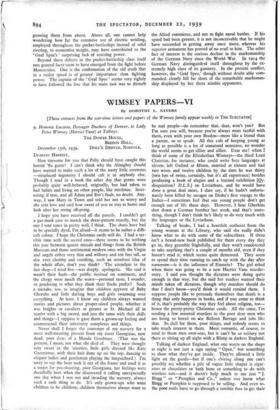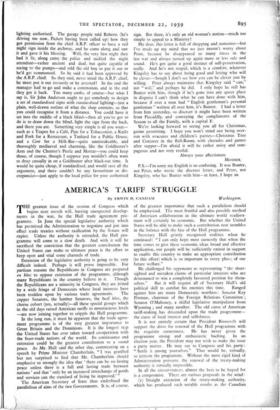WIMSEY PAPERS VI
By DOROTHY L. SAYERS [These extracts from the war-time letters and papers of the Wimsey family appear weekly in THE SPECTATOR] 9. Honoria Lucasta, Dowager Duchess of Denver, to Lady Peter Wimsey (Harriet Vane) at Talboys.
THE DOWER HOUSE, BREDON HALL, December 15th, 1939. DUKE'S DENVER, NORFOLK.
DEAREST HARRIET, How tiresome for you that Polly should have caught this horrid 'flu germ! I can't think why the Almighty should have wanted to make such a lot of the nasty little creatures —misplaced ingenuity I should call it in anybody else. Though I read in a book the other day that germs were probably quite well-behaved, originally, but had taken to bad habits and living on other people, like mistletoe. Inter- esting, if true, and all Adam and Eve's fault, no doubt. Any- way, I saw Mary in TOWn and told her not to worry and she sent love and said how sweet of you to stay at home and look after her erring offspring.
I hope you have received all the parcels. I couldn't get a gas-mask case to match the dress-pattern exactly, but the one I sent tones in pretty well, I think. The shoes have had to be specially dyed, I'm afraid—it seems to be rather a diffi- cult colour. I hope the Christmas cards will do. I had a ter- rible time with the sacred ones—there seems to be nothing this year between quaint missals and things from the British Museum and those sentimental modern ones with the Virgin and angels either very thin and willowy and ten feet tall, or else very chubby and smirking, such an unrobust idea of the whole affair, don't you think? The attendant in the last shop—I tried five—was deeply apologetic. She said it wasn't their fault—the public insisted on sentiment, and the clergy were much the worst—personal taste, I wonder, or pandering to what they think their flocks prefer? Such a mistake, too, to imagine that children approve of Baby Cherubs and little darling boys and girls swarming over everything. At least, I know my children always wanted stories and pictures about proper-sized people, whether it was knights or cavaliers or pirates or St. Michael all in scarlet with a big sword, and just the same with their dolls and things—I suppose it gave them a grown-up feeling and counteracted their inferiority complexes and things.
Never shall I forget the contempt of my nursery for a most well-meaning present from my sister Georgiana, now dead, poor dear, of a Maude Goodman. (That was the present, I mean, not what she died of. They were thought very sweet in the 'nineties, little girls dressed like Kate Greenaway, with their hair done up on the top, dancing to elegant ladies and gentlemen playing the harpsichord.) I'm sorry to say the boys took it out of the frame and used it as a target for pea-shooting, poor Georgiana, her feelings were dreadfully hurt when she discovered it calling unexpectedly one day when I was out and invading the nursery, always such a rash thing to do. It's only grown-ups who want children to be children; children themselves always want to be real people—do remember that, dear, won't you? But I'm sure you will, because you're always most tactful with them, even with your own Bredon—more like a friend than a parent, so to speak. All this cult of keeping young as long as possible is a lot of unnatural nonsense, no wonder the world seems to get sillier and sillier. Dear me! when I think of some of the Elizabethan Wimseys—the third Lord Christian, for instance, who could write four languages at eleven, left Oxford at fifteen, married at sixteen and had two wives and twelve children by the time he was thirty (two lots of twins, certainly, but it's all experience) besides producing a book of elegies and a learned exhibition [Qy. disquisition? D.L.S.] on Leviathans, and he would have done a great deal more, I dare say, if he hadn't unfortu- nately been killed by savages on Drake's first voyage to the Indies—I sometimes feel that our young people don't get enough out of life these days. However, I hear Gherkins shot down a German bomber last week, and that's some- thing, though I don't think he's likely to do very much with the languages or the Leviathans.
Talking of books, I had a heartfelt outburst from the young woman at the Library, who said she really didn't know what to do with some of the subscribers. If there isn't a brand-new book published for them every day they go in, they grumble frightfully, and they won't condescend to take anything that's a couple of months old, even if they haven't read it, which seems quite demented. They seem to spend their time running to catch up with the day after tomorrow—is it the influence of Einstein? The girl asked when there was going to be a new Harriet Vane murder- story. I said you thought the dictators were doing quite enough in that way, but she said her readers wanted their minds taken off dictators, though why murders should do that I don't know—you'd think it would remind them. 1 suppose people like to persuade themselves that death is a thing that only happens in books, and if you come to think of it, that's probably the way they feel about religion, too— hence the pretty-pretty Christmas cards. All the same, I'm sending a few assorted murders to the poor dear men who are being so bored on she Balloon Barrage and jobs like that. So dull for them, poor things, and nobody seems to take much interest in them. More romantic, of course, to send to them men over-seas, but it can't be so solitary out there as sitting up all night with a Blimp in darkest England.
Talking of darkest England, what one wants on the shops at night is not just a sign saying " Open," but something to show what they've got inside. They're allowed a little light on the goods—but if one's driving along one can't possibly see whether a pile of vague little shapes is cigar- ettes or chocolates or bath buns or something to do with wireless sets—and it doesn't help much to see just "j. Blogg " or " Pumpkin and Co.," unless you know what Blogg or Pumpkin is supposed to be selling. And even so, the poor souls have to go through a terrible fuss to get their lighting authorised. The garage people told Roberts (he's driving me now, Pickett having been called up) how they got permission from the chief A.R.P. officer to have a red night sign inside the archway, and he came along and saw it and gave it his blessing. Well, the very first night they had it lit, along came the police and tackled the night attendant—rather ancient and deaf, but quite capable of seeing to the pumps—and told the old boy to put it out or he'd get summonsed. So he said it had been approved by the A.R.P. chief. So they said, never mind the A.R.P. chief, he must put it out instantly or be arrested! In the end the manager had to go and make a commotion, and in the end they got it back. Too many cooks, of course—but what I say is, Sir John Anderson ought to get somebody to design a set of standardised signs with standardised lighting—just a plain, well-drawn outline of what the shop contains, so that you could recognise it from a distance. You could have it set into the middle of a black blind—then all you've got to do is to draw down the blind, light the sign from the back, and there you are. Something very simple is all you want— such as a Teapot for a Café, Pipe for a Tobacconist, a Knife and Fork for a Restaurant, a Tankard for a Public House, and a Cow for a Milk-Bar—quite unmistakeable, and thoroughly mediaeval and charming, like the Goldbeater's Arm and the Chemist's Pestle and Mortar—you could keep those, of course, though I suppose you wouldn't often want to drop casually in on a Goldbeater after black-out time. It would be quite cheap, if standardised, and would save all the argument, and there couldn't be any favouritism or dis- crepancies—just apply to the local police for your authorised sign. But there, it's only an old woman's notion—much too simple to appeal to a Ministry!
My dear, this letter is full of shopping and nonsense—but I've made up my mind that we just mustn't worry about Peter, because he disappeared so many times in the last war and always turned up again more or less safe and sound. He's got quite a good instinct of self-preservation, really. And he's not stupid, which is a comfort, whatever Kingsley has to say about being good and letting who will be clever—though I don't see how you can be clever just by willing. Peter always maintains that Kingsley said " can," not " will," and perhaps he did. I only hope he still has Bunter with him, though if he's gone into any queer place in disguise I can't think what he can have done with him, because if ever a man had " English gentleman's personal gentleman " written all over him, it's Bunter. I had a letter from him yesterday, so discreet it might have been written from Piccadilly, and conveying the compliments of the Season to all the Family, with a capital F.
We're looking forward to seeing you all for Christmas, germs permitting. I hope you won't mind our being over- run with evacuees and children's parties—Christmas Tree and Conjurer in the Ball-Room, with charades and games after supper—I'm afraid it will be rather noisy and ram- pageous and not very restful.
Always your affectionate MOTHER.
P.S.—I'm sorry my English is so confusing. It was Bunter, not Peter, who wrote the discreet letter, and Peter, not Kingsley, who has Bunter with him—at least, I hope so.





































 Previous page
Previous page